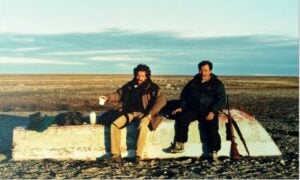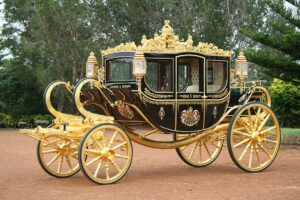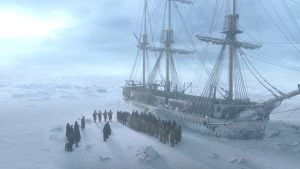From Lady Franklin of Russell Square
1 August 1847
MY DEAREST LOVE,
Here I am supposed to say thank you for your latest letter, but instead I offer a gentle reminder that I am still waiting. Are you thinking of me? Daily we expect news of you from the west, Esquimalt or Victoria — why is there none? There is nothing in the papers, nor any news from Whitehall. I imagine you are ready for those weeks of recuperation: juleps, fresh cotton, fine linens for the table, new books. Your own library aboard the Erebus must be thumbed half to death — perhaps you’ve even been forced into opening The Vicar of Wakefield! How I laughed when I saw that awful novel was still part of the ship’s collection. You should have put it right next to the Bible — haha! I imagine you’ve found some way of getting rid of it by now. I tease, but these are gentle returns to common humanity after all that heroism, no? Are you tired of the legend you are making?
Each afternoon, I sit at tea in Bedford Place and can almost feel you with me; I miss those moments of easy silence between us before the world intruded once more and we went “zigzagging” (as they say in France) off like dragonflies to our various destinations. Lately I have been pulling out our old map of London — do you remember the one? We drew the lines of our travels between your postings, after the happy Rainbow and before those forgettable years in Van Diemens Land, the routes in and out of the City almost soaked through with ink, the Admiralty offices a ruined hole in the fabric, as much as Russell Square, but with those dainty tendrils trailing elegantly off into the countryside, too … I did the same with the map of America Eleanor and I shared, but she wasn’t so interested in seeing where she’d been; her fascination was with what was right in front of her. I can appreciate this — she is young and relies on the present — but there is nothing quite so wonderful as to watch your trail unfold like a dark stream across the page, the space literally covered with your passage over it. Actually, there are perhaps two things just as wonderful: to give those places names, and to look forward to where you have yet to go. And you are doing all three, my love! How proud you must be. How proud I already am of you! I cannot wait to see the map you have drawn, to trace your movements through those blank spaces with my finger, all the way around the Horn and straight back to me.
I have started a new map of London — this time it is my own, to accompany these letters. So far I have attended a musical concert in Piccadilly and one conversazione in Hampstead, and of course gone several times to Russell Square, the space of which is already weakening under the weight of ink I’ve applied to it. No matter: I know that lovely shape by heart, and in the crystallized incursions of blue and black ink that expand beyond its borders on the map, I can still make out my little buds of campion, fighting valiantly against obliteration. I think they are waiting for you, too, as their blooms are lasting longer than usual this season. I think they’ve even had two blooming sessions, a London miracle.
Yesterday, a sunny day, there were three pigeons on the Duke: one on each shoulder and the largest on his head. I don’t need to tell you directly what was happening up there, but the Duke looked ashamed of those impromptu epaulettes and that rather imperfect peer’s wig. You should have seen his expression: his mature resignation, his dignified acceptance of his avian burden! He gazed haplessly, stoically above my head, wondering how it had all come to this. “Well,” I consoled him, “it’s a lesson for the ages.” I attempted to shoo them away, but short of throwing a pebble at them, which would have brought a Bobby, they were immovable, so I left them to their triumph, knowing the good Duke would eventually clean himself off, and in a war of attrition, he would emerge triumphant. I gave him what I hope he accepted as a sympathetic wave.
We had some peaches delivered this week, from the Keables, our wonderful old friends from Mortimer — they arrived in a crate loaded with clean straw and ice, ice, ice! They were perfectly firm, and not a bruise on one of them — better than any strawberry — and so cold! You would think peaches were a polar fruit! Eleanor and I, and even Mary, somehow between engagements, each grabbed one and herded ourselves out into the patchy little back garden in Bedford Place that was never cared for by us when we were growing up, where we sat ourselves against the wall, crouching in that one triangle of sun that pushes its way between the buildings in the middle of the afternoon. It was hot and breezeless, a perfectly still moment, and the scent of the peaches pushed the odour of coal and horses, shoeblacking and slops out of our heads for a few precious moments. And without a thought to the work ahead of us on our cuffs or collars, we set to on those peaches, bursting them with our teeth, ripping the skins like carnivores, letting the juice run down our chins. Oh! That tart sweetness was as painful as a first kiss. I watched Eleanor; she had her eyes closed. Mary and I made faces at each other, the peach juice dribbling out the corners of our mouths. We were working ourselves up to a froth of silent hilarity when Eleanor let escape the most profound sigh, her eyes still closed, and murmured,
“How I wish Papa were here!”
Not that you have ever, my love, been a check on my behaviour (and for that I adore you), but Mary and I quickly collected ourselves and attempted to eat the rest of our peaches in dignified silence. “We wish he were here, too, Eleanor,” I consoled her. Mary snorted — “yes,” she said, “for he would have known how to eat this peach!” At that, everything devolved back to its original merriment, and even melancholy Eleanor joined in, and you were right there among us, peach juice on your own chin, and your face the funniest and stickiest of all. We couldn’t save one for you, but we ate the peach that should have been yours with gusto, taking turns telling lovely stories about you as we shared it between us, bite for bite.







